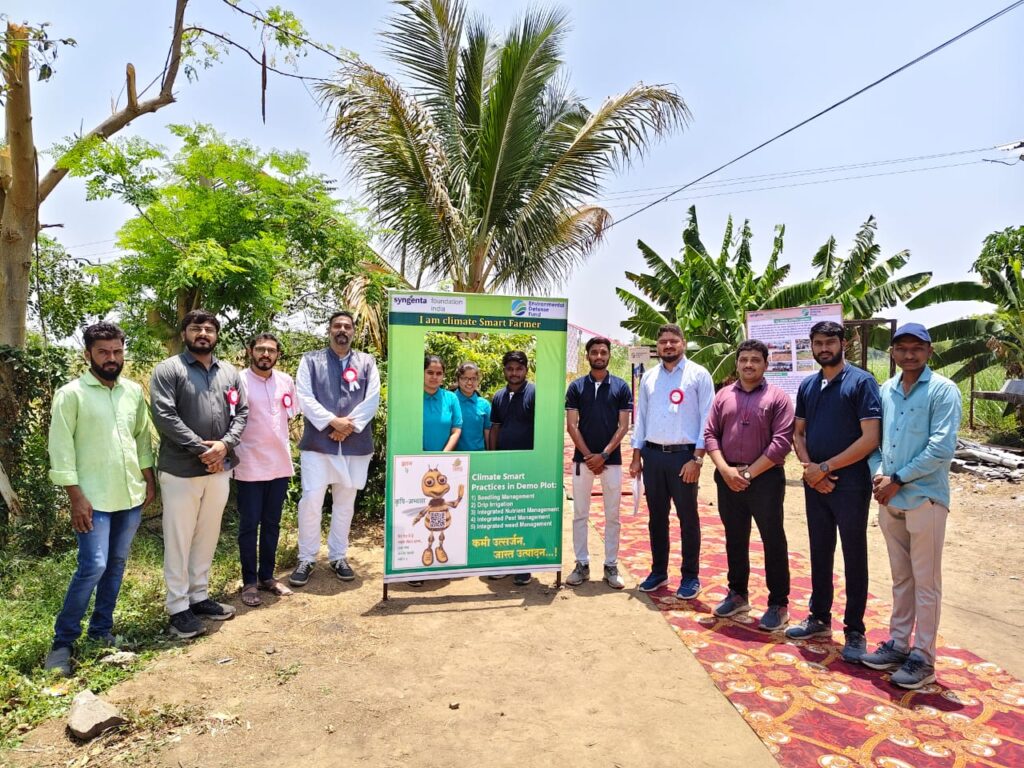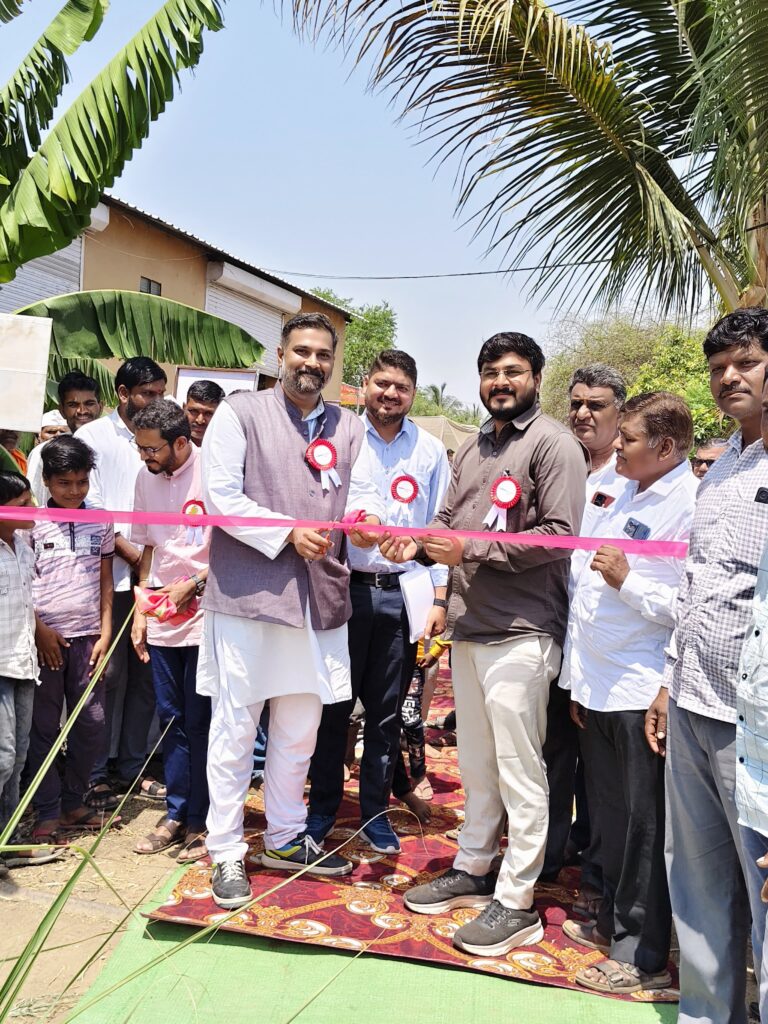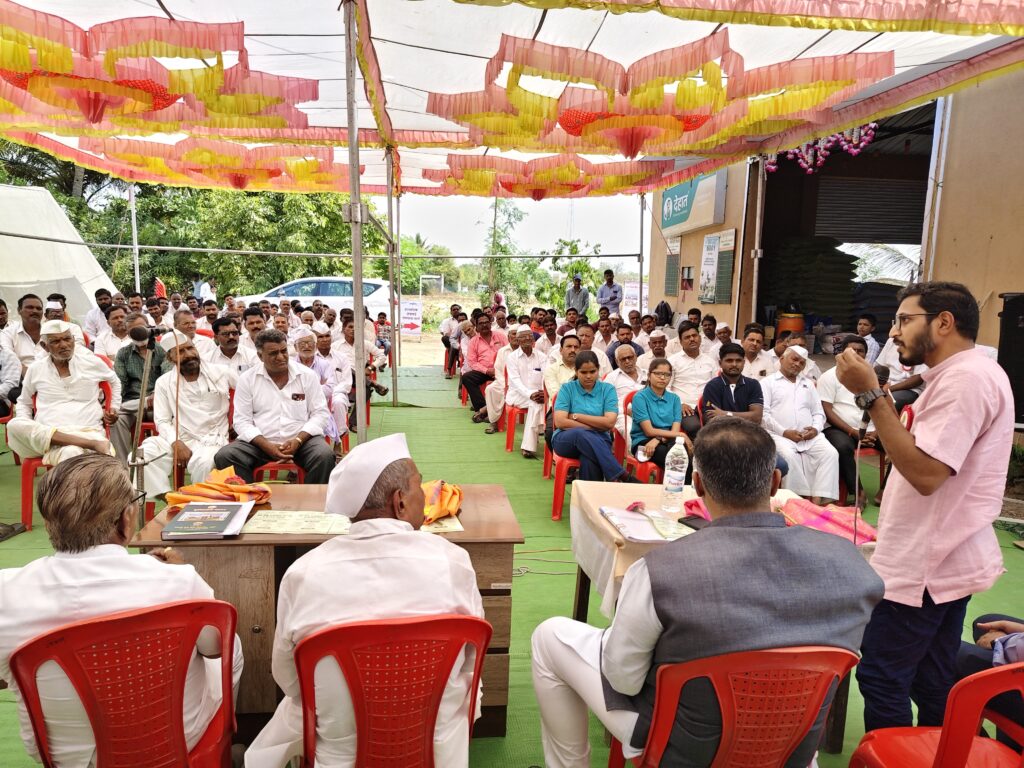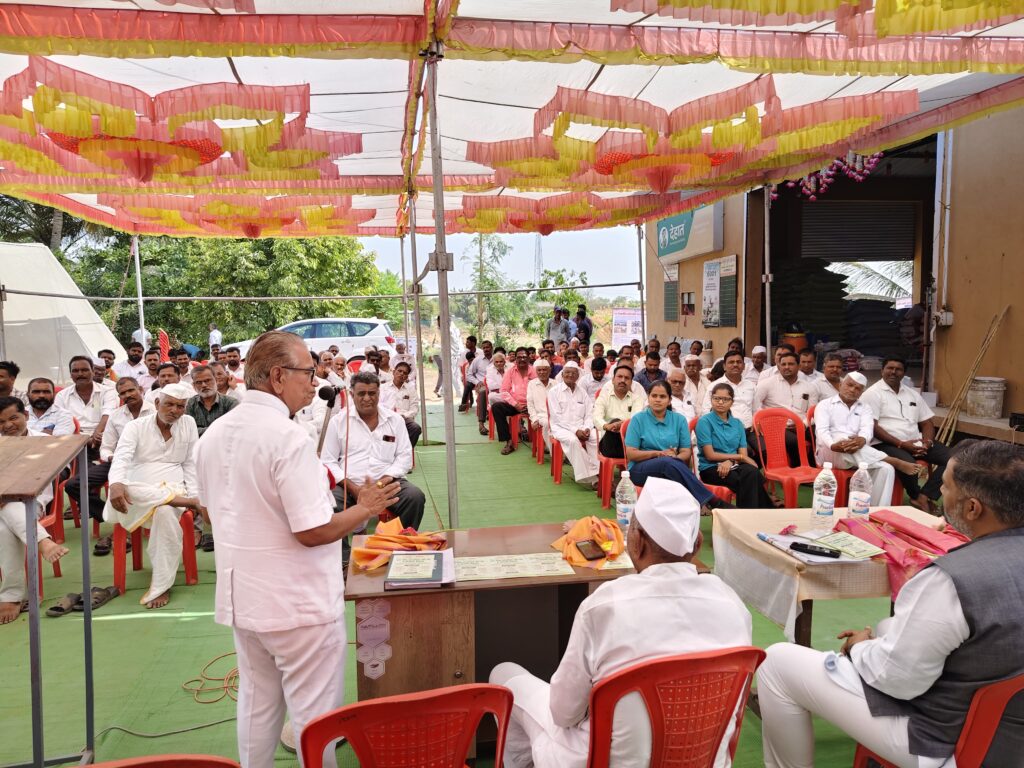With a vision to foster climate-resilient agriculture through the Agri-Entrepreneur (AE) network, the Climate-Smart Agriculture (CSA) project, in partnership with EDF, continued to drive field-level transformation across Maharashtra in May 2025.
Sugarcane Demo event at Ahilyanagar
On 6th May, a farmer field day on sugarcane demonstration plot was held at Patharvala Village, Newasa (Ahilyanagar), centered around ratoon management using drip irrigation and straw management—a crucial CSA practice to reduce input costs and improve sugarcane yield.
The event was graced by dignitaries including Mr. Pandurang Abhang (Former MLA and Vice Chairman, DSSK Sugar Factory); Dr. Ashok Dhage (Former Vice-Chancellor, Nagpur); Mr. Nikhil Goveas (Lead Advisor, EDF); Mr. Udaya Vaddi (Project Lead), and Mr. Samir Mirza (CSA Advisor).




Key discussions focused on:
- Enhancing soil health and balanced micronutrient use.
- Increase fertilizer and energy efficiency, which leads to climate benefits.
- Utilizing the Nitrogen Balance Tool (N Balance) to optimize fertilizer input.
- Importance of varietal changes and timely seed replacement to combat climate extremes and nonextreme events.
- More than 200 farmers participated in the event to observe CSA practice and resolve queries for better ratoon management.
Cotton & Wheat End-of-Season Survey in Wardha
The project also launched a massive end-of-season survey campaign in Wardha, targeting 8,000 farmers engaged in cotton and wheat cultivation.
Led by 100 trained Master Trainers, the survey aims to assess:
- Agronomic practices followed
- Fertilizer usage patterns
- Actual yield outcomes
This data will power nitrogen reduction advisories for the next cropping season, helping farmers transition toward sustainable, low-input farming models.
As of May end, 3,500+ surveys have already been completed, marking strong progress toward the target.
The EDF–SFI collaboration continues to exemplify how evidence-backed CSA practices and AE-driven extension models can together lead India’s rural farming communities toward climate resilience and economic stability.
Case Study: Prafful Diwakar Bele – Embracing Climate-Smart Agriculture for Cotton Farming
Prafful Diwakar Bele is a 28-year-old educated and progressive farmer from Yeranwadi village in Wardha district of Maharashtra. With a graduation degree and deep-rooted passion for agriculture, he supports a family of four by cultivating cotton during Kharif and red gram during Rabi on his five-acre farmland.
Prafful’s farming journey was severely impacted by unpredictable weather patterns, particularly heavy rainfall during the Kharif season, which damaged crops and delayed harvests. In 2024, mid-August rains caused late flowering in cotton, extending the harvesting season till February. Additionally, a lack of awareness of climate-smart agricultural (CSA) techniques limited his ability to respond to these climate anomalies effectively.
His turning point came when he engaged with Agri-Entrepreneur Mentors (AEMs) under the EDF–CSA Project. Through consistent training sessions, Prafful learned about the effects of climate change and adaptive techniques. He also participated in the Cotton N Balance Survey and received customized advisory, with his nitrogen use found to be within the optimum range.
He began implementing the following CSA techniques:
- Ridge and Furrow Bed Method for improved drainage and crop stability
- Integrated Nutrient Management (INM) with balanced micronutrients
- Integrated Pest Management (IPM) using traps to reduce chemical dependency

These interventions enabled him to maintain healthy crops even during excessive rains, ensuring standing crops and improved plant vigor.
Impact & Results
| Metric | Control: Traditional practices | Treated: CSA practices | Change |
| Cotton Yield (quintals/acre) | 10 quintals | 13 quintals | 🔼 37% increase |
| Input Cost | ₹21,520 | ₹19,110 | 🔽 11% reduction |
| Cultivation Cost | ₹42,440 | ₹43,430 | 🔽 2% reduction |
| Urea Use (per acre) | 112.5 Kg | 90 Kg (Saved half bag) | 🔽 Efficient use |
| Sprayings | Regular | 2 fewer rounds | 🔽 Reduced frequency |
By adopting CSA, Prafful not only improved yield but also achieved cost savings of inputs, thereby enhancing profitability and resilience.
Initially skeptical about the ridge and furrow method, Prafful was convinced by the visible improvements in plant health and yield. Today, he confidently advocates CSA practices among fellow farmers and emphasizes balanced fertilization based on soil tests.
Prafful plans to scale CSA practices across all five acres, continue soil testing for customized nutrient management and adopt improved seed treatment methods for better resilience
Prafful’s journey is a powerful example of how knowledge, technology, and community support can transform farming. His success highlights the importance of climate-smart solutions in ensuring long-term sustainability and income security for smallholder farmers.

